 Uncle Sinner is a band from Winnipeg (a.k.a. "Sinnerpeg"), Manitoba in Canada. This article series focus, as you may have noticed, primarily on artists and bands from United States. Only a few exceptions will be made and only if it’s justified by the quality and originality. Uncle Sinner clearly meets these two criteria. The band Uncle Sinner consists of Uncle Sinner (Mike Bodner) on vocals, banjo and guitar and Fuller Vengeance (Matt McLeod) on vocals, bass, mandolin, guitar, percussion and banjo. In my opinion, the pseudonyms are very fitting. Uncle Sinner was formed in 2007. In an e-mail Uncle Sinner tells the story of when and how the band was formed: “There's a couple of ways to answer that, one being that I've been playing stuff like Blind Willie Johnson tunes since I was 13 or 14. When I heard Bob Dylan's "The Ballad of Hollis Brown" when I was 16 it kind of destroyed my mind in a wonderful way, and that's probably when I started being interested in a blend of blues and mountain music. I think a lot of gothic country owes a debt to Hollis Brown. The other way to answer it is to say that I met Matt at a folk music retreat in summer of 2007. He offered to record a couple of songs as I had no recording gear, apart from a really crappy reel to reel tape machine. We recorded a few songs one weekend (the solo songs on the cd), and we were both excited enough by the sound to want to explore it further. Without Matt, the cd wouldn't have happened - I'd have just gone on playing music for myself and my friends.” Uncle Sinner is a brilliant name for a band in this genre. I think many bands, after spending many hours on sites like Band Name Maker would consider to cut off one or two arms (despite the obvious negative effects) to get a hold of a name like this. However, the story behind Uncle Sinner is not as conceived as you might think. In the e-mail Uncle Sinner explains: “I wouldn't say I put a lot of thought into it. Maybe if I'd spent more time on it I could have thought of a real crusher. There's a lot of uncle bands, and I think the word creates a sense of family. My uncles on my mother's side would always bring guitars to Sunday dinners, and they were a big influence on me. As to "sinner", I thought it might help to put some distance between me and the more overt religious material --something to help people realize that I'm not coming at the material from the point of view of an evangelist. That said, I guess really religious people call themselves sinners too -- I remember as a kid, driving up to the lake country in the summer, there was a farmer with a sign on his field that read "O Lord have mercy on me a sinner". At any rate, the name "Uncle Sinner" is simple and not trying to be funny (which gets tired fast), so I think it does the job.”
Uncle Sinner is a band from Winnipeg (a.k.a. "Sinnerpeg"), Manitoba in Canada. This article series focus, as you may have noticed, primarily on artists and bands from United States. Only a few exceptions will be made and only if it’s justified by the quality and originality. Uncle Sinner clearly meets these two criteria. The band Uncle Sinner consists of Uncle Sinner (Mike Bodner) on vocals, banjo and guitar and Fuller Vengeance (Matt McLeod) on vocals, bass, mandolin, guitar, percussion and banjo. In my opinion, the pseudonyms are very fitting. Uncle Sinner was formed in 2007. In an e-mail Uncle Sinner tells the story of when and how the band was formed: “There's a couple of ways to answer that, one being that I've been playing stuff like Blind Willie Johnson tunes since I was 13 or 14. When I heard Bob Dylan's "The Ballad of Hollis Brown" when I was 16 it kind of destroyed my mind in a wonderful way, and that's probably when I started being interested in a blend of blues and mountain music. I think a lot of gothic country owes a debt to Hollis Brown. The other way to answer it is to say that I met Matt at a folk music retreat in summer of 2007. He offered to record a couple of songs as I had no recording gear, apart from a really crappy reel to reel tape machine. We recorded a few songs one weekend (the solo songs on the cd), and we were both excited enough by the sound to want to explore it further. Without Matt, the cd wouldn't have happened - I'd have just gone on playing music for myself and my friends.” Uncle Sinner is a brilliant name for a band in this genre. I think many bands, after spending many hours on sites like Band Name Maker would consider to cut off one or two arms (despite the obvious negative effects) to get a hold of a name like this. However, the story behind Uncle Sinner is not as conceived as you might think. In the e-mail Uncle Sinner explains: “I wouldn't say I put a lot of thought into it. Maybe if I'd spent more time on it I could have thought of a real crusher. There's a lot of uncle bands, and I think the word creates a sense of family. My uncles on my mother's side would always bring guitars to Sunday dinners, and they were a big influence on me. As to "sinner", I thought it might help to put some distance between me and the more overt religious material --something to help people realize that I'm not coming at the material from the point of view of an evangelist. That said, I guess really religious people call themselves sinners too -- I remember as a kid, driving up to the lake country in the summer, there was a farmer with a sign on his field that read "O Lord have mercy on me a sinner". At any rate, the name "Uncle Sinner" is simple and not trying to be funny (which gets tired fast), so I think it does the job.”
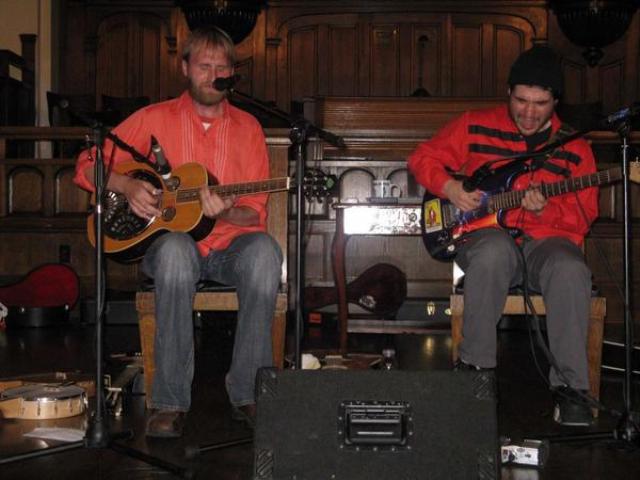 Uncle Sinner’s mission statement is "who adapts traditional American music for his own purposes". In the e-mail Uncle Sinner elaborates this statement: "Traditional music can be quite minimalistic--to connect with it, it helps to bring your own experiences to the material. What sounds simple at first can become more complex. Take a line like "I'm a poor boy and a long way from home": it's actually incredibly complicated. What is home to you? Is it a place, is it bound up with certain people, is it about your ideal? Why are you poor? How did you come to be that way? In a sense, every Uncle Sinner song is an iteration of that one line. With the religious songs, the message is similar but they emphasize that feeling of "I'm going home". So with Uncle Sinner I try to take songs that can resonate with me, that can speak to my experience. Maybe not literally--I didn't actually kill anyone named Polly, for example -- but apart from that song the ones on the cd all speak to something I've felt. With a song like "Jack o' Diamonds", I took the basic gambling imagery and bent it so that it's about something different; a sense of never having enough. It's about addiction in the larger sense, about the hole at the centre. Gambling is one addiction, drugs another, affirmation from others yet another. I adapt the songs because I'm not interested in playing a character. I could sing in a Kentucky accent, but I deliberately sing in my own flat, Canadian prairie accent. Musical performance is a bit like acting -- you have to believe what you're saying to be any good. When I'm singing, I'm dredging up the past, but it's my own past usually. I'm not a good enough actor to pull off being someone I'm not and have never been. The songs can seem negative to people, and I guess if you were to look closely at them you might think I have this terrible life that's devoid of humour--I don't. I laugh all the time, because laughing is just as good of a release of tension as belting out a song like "Wayfaring Stranger". I like to sing about some of those feelings of tension because the act of singing (and, if people can connect with it, the act of listening and empathizing) gives me power over them. As Matt put it, you can either ride the plow or fall beneath. So Uncle Sinner is about riding the plow.”
Uncle Sinner’s mission statement is "who adapts traditional American music for his own purposes". In the e-mail Uncle Sinner elaborates this statement: "Traditional music can be quite minimalistic--to connect with it, it helps to bring your own experiences to the material. What sounds simple at first can become more complex. Take a line like "I'm a poor boy and a long way from home": it's actually incredibly complicated. What is home to you? Is it a place, is it bound up with certain people, is it about your ideal? Why are you poor? How did you come to be that way? In a sense, every Uncle Sinner song is an iteration of that one line. With the religious songs, the message is similar but they emphasize that feeling of "I'm going home". So with Uncle Sinner I try to take songs that can resonate with me, that can speak to my experience. Maybe not literally--I didn't actually kill anyone named Polly, for example -- but apart from that song the ones on the cd all speak to something I've felt. With a song like "Jack o' Diamonds", I took the basic gambling imagery and bent it so that it's about something different; a sense of never having enough. It's about addiction in the larger sense, about the hole at the centre. Gambling is one addiction, drugs another, affirmation from others yet another. I adapt the songs because I'm not interested in playing a character. I could sing in a Kentucky accent, but I deliberately sing in my own flat, Canadian prairie accent. Musical performance is a bit like acting -- you have to believe what you're saying to be any good. When I'm singing, I'm dredging up the past, but it's my own past usually. I'm not a good enough actor to pull off being someone I'm not and have never been. The songs can seem negative to people, and I guess if you were to look closely at them you might think I have this terrible life that's devoid of humour--I don't. I laugh all the time, because laughing is just as good of a release of tension as belting out a song like "Wayfaring Stranger". I like to sing about some of those feelings of tension because the act of singing (and, if people can connect with it, the act of listening and empathizing) gives me power over them. As Matt put it, you can either ride the plow or fall beneath. So Uncle Sinner is about riding the plow.”
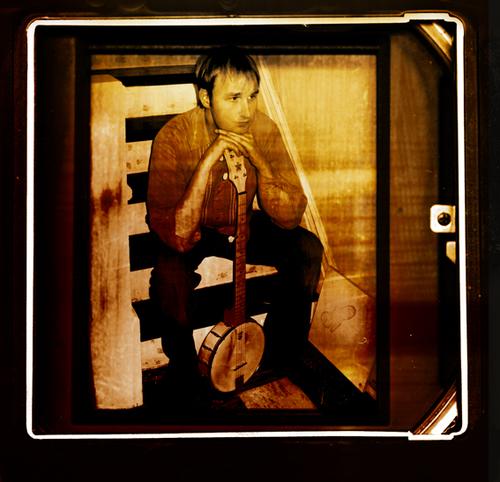 Personally I categorize Uncle Sinner as "death country" along with artists like Those Poor Bastards, Sons of Perdition and Slackeye Slim. But while the latter artists write original songs, Uncle Sinner "transforms" old traditional songs into new songs (alongside original songs). It’s called covers in a general context, but I want to emphasize that Uncle Sinner don’t make any covers in the traditional sense. It’s far too comprehensive, different and innovative to be called covers. In an interview on the reputable site ninebullets.net Uncle Sinner declares: "I pick the songs and adjust them for my needs, trying to hammer them into a shape where I can sing them without being phony or a wanna be.” And hammering and shaping is exactly what Uncle Sinner does. Very covered and worn out songs like Poor Pilgrim of Sorrow, The Cuckoo, Jack of Diamonds and Shady Grove gets a new (and better) life with Uncle Sinner. While I was searching for the right words to describe the music, I found this on their Myspace-page: "Uncle Sinner plays music that sweats, scratches and stomps. Most of his songs are created using the skeletons of traditional American music, but the words are often re-written and the bones rearranged. Uncle Sinner accompanies his arrangements with banjo, slide guitar and various other guitars. At the centre of the music, however, is a voice that drives the music forward and expresses the complex emotions that lie beneath the songs.” Well, much better worded than I ever could express. It’s banjo-driven, simple and unadorned. In my opinion, the thing that makes Uncle Sinner so interesting is the casual attitude and smooth transition over genres like blues and country. Uncle Sinner is deeply rooted in the American tradition. At the same time, you can almost trace a link in the mournful banjo playing to his great-grandfather who emigrated from a desolate and melancholic part of Sweden to Canada in 1892. A caveat is in place. Uncle Sinner’s music is not the kind of upbeat music you play before going to a party. It’s not the kind of music you play at a party. And it's probably not the kind of music to play after a party. Uncle Sinner’s music is something you play in solitude when you feel a little depressed and neither has any great desire or particular hurry to feel any better. It also fits when drinking alone. The themes are sadness, heartbreak, death and sin. Pale, tuneless, bitter, ugly and simple are adjectives commonly used to describe the mood of Uncle Sinner. If I may be so bold and contribute with a new label to the already abundant flora in the “gothic country” genre, I would label Uncle Sinner as "dark canadiana".
Personally I categorize Uncle Sinner as "death country" along with artists like Those Poor Bastards, Sons of Perdition and Slackeye Slim. But while the latter artists write original songs, Uncle Sinner "transforms" old traditional songs into new songs (alongside original songs). It’s called covers in a general context, but I want to emphasize that Uncle Sinner don’t make any covers in the traditional sense. It’s far too comprehensive, different and innovative to be called covers. In an interview on the reputable site ninebullets.net Uncle Sinner declares: "I pick the songs and adjust them for my needs, trying to hammer them into a shape where I can sing them without being phony or a wanna be.” And hammering and shaping is exactly what Uncle Sinner does. Very covered and worn out songs like Poor Pilgrim of Sorrow, The Cuckoo, Jack of Diamonds and Shady Grove gets a new (and better) life with Uncle Sinner. While I was searching for the right words to describe the music, I found this on their Myspace-page: "Uncle Sinner plays music that sweats, scratches and stomps. Most of his songs are created using the skeletons of traditional American music, but the words are often re-written and the bones rearranged. Uncle Sinner accompanies his arrangements with banjo, slide guitar and various other guitars. At the centre of the music, however, is a voice that drives the music forward and expresses the complex emotions that lie beneath the songs.” Well, much better worded than I ever could express. It’s banjo-driven, simple and unadorned. In my opinion, the thing that makes Uncle Sinner so interesting is the casual attitude and smooth transition over genres like blues and country. Uncle Sinner is deeply rooted in the American tradition. At the same time, you can almost trace a link in the mournful banjo playing to his great-grandfather who emigrated from a desolate and melancholic part of Sweden to Canada in 1892. A caveat is in place. Uncle Sinner’s music is not the kind of upbeat music you play before going to a party. It’s not the kind of music you play at a party. And it's probably not the kind of music to play after a party. Uncle Sinner’s music is something you play in solitude when you feel a little depressed and neither has any great desire or particular hurry to feel any better. It also fits when drinking alone. The themes are sadness, heartbreak, death and sin. Pale, tuneless, bitter, ugly and simple are adjectives commonly used to describe the mood of Uncle Sinner. If I may be so bold and contribute with a new label to the already abundant flora in the “gothic country” genre, I would label Uncle Sinner as "dark canadiana".
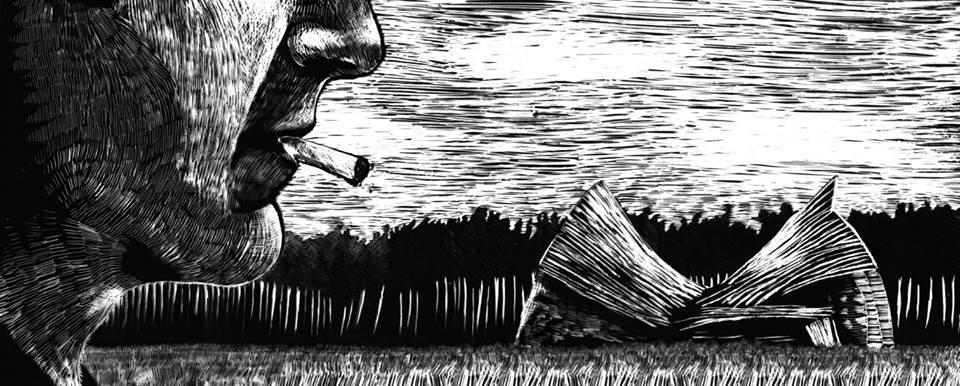
Uncle Sinner is best known for the song "When Jesus Comes" which, incidentally, is on one (Rodentia I) of the four compilations with The Best of Dark Roots from legendary but defunct Devil’s Ruin Records. This is also how I discovered Uncle Sinner. However, I would have stumbled across them anyway, since Uncle Sinner is on virtually every reputable list of recommendations and occurs on initiated threads about "gothic country" on various online forums. "When Jesus Comes" is a very odd song with sampled "spoken word" elements. It consists basically of a sermon where the aim seems to be to recruit members from a rival church. Matt McLeod found the record in a thrift store in Steinbach, a small Mennonite town southeast of “Sinnerpeg”. In the e-mail Uncle Sinner tells the story behind the idea to use "spoken word" from the record: “I didn't come up with the idea--that was Matt. He had that record and decided to fill out the song with it. The first time I heard what he had done with it--adding the demonized voice, crazy bouncy bass and preaching--I laughed till there were tears rolling down my face.“ In the sermon the preacher asks questions to the congregation and (to be on the safe side) answer them himself (text marked in red). It’s hilarious.
"Our Minister preached last Sunday morning on Hell
And I surely did not like his sermon You see,
I do not believe the Bible makes Hell very important
Well now listen, the are 264 chapters in the New Testament
And in 234 times, that is nearly once in every chapter
God speaks of eternal punishment
Jesus Christ spoke more of Hell than He did of Heaven
Tell me what will you do when Jesus comes?
Whatcha gonna when Jesus comes?
Will you kick him out in the street
Or will you let him have your seat?
Tell me what will you do when Jesus comes?
What do you think about the Jesus People?
I stand by your Minister
As a result of the Jesus Movement
Many young people have gone from drugs
The have adopted a high moral standard
They settled down to work
And they have really found a worthwhile purpose in life
What should I do about the Jesus People?
Tell me where will you run to when Jesus comes?
Where you gonna run when Jesus comes?
Will you put it off another day
Or will you let him have his way?
Where will you run when Jesus comes?
They seem to have happiness I do not found in my church
I would love to attend their meetings, but my parents object
I am 15 years of age, what should I do about the Jesus People?
Here is my answer: I do not go along with everything the Jesus People do
But I do not go along either with everything some church people do
I stand by your Minister
Tell me who will you love when Jesus comes?
God speaks of eternal punishment
Who you gonna love when Jesus comes?
I stand by your Minister
Will you look him straight in the eye
Or will you be just a little too high?
Who will you love when Jesus comes?
Now it’s too bad you do not see the happiness in your church
That you find in the Jesus Movement
I can understand why you would like to go to their meetings
I stand by your Minister
Your Minister and my Book is absolutely correct
Jesus Christ spoke more of Hell than He did of Heaven"
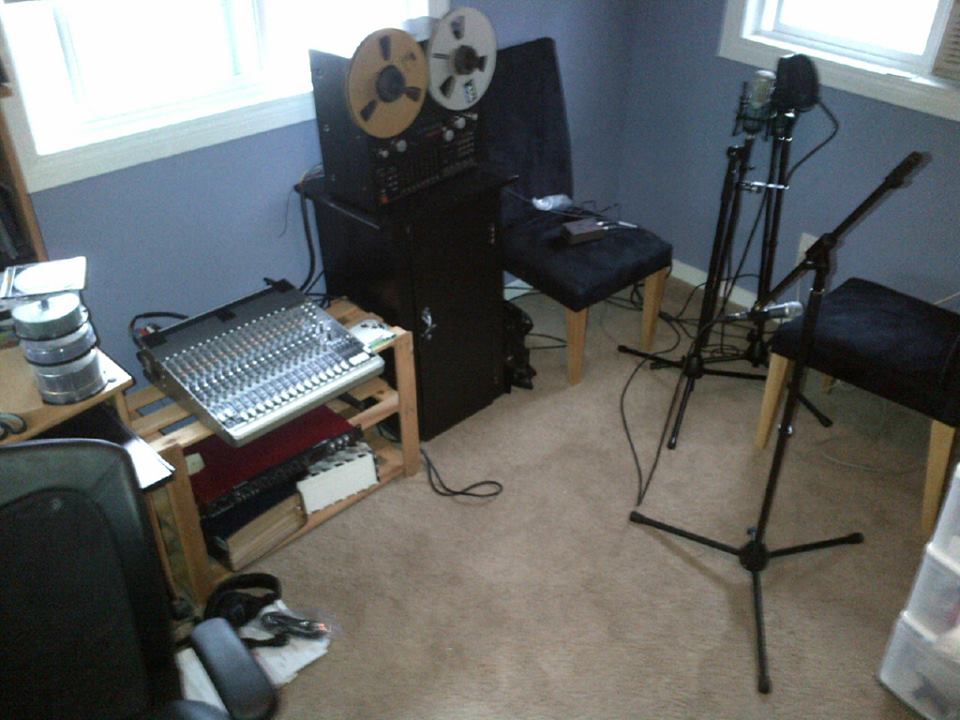 Uncle Sinner has released three proper albums, "Ballads and Mental Breakdowns (2008) on now defunct Devil's Ruin Records, "Let the Devil In" (2105) and "Trouble of this World" (2020). In the e-mail Uncle Sinner explains how the songs on the first album were selected: “They were just songs that I was playing around with at the time. They had a certain sound or aesthetic and fit together. I play other types of folk-ish music, but I wanted a more or less consistent sound for Uncle Sinner--something from the border country between country blues and Appalachian music, though a bit of it is straight country blues.” The album title is a humorous but polite nod to traditional music. In the e-mail Uncle Sinner writes: “There's a Folkways album called "Ballads and Breakdowns", with the breakdowns being the faster dance numbers. Of course, "breakdown" has another meaning in English, so I was just playing with that. It's a joke, but it's one that alerts people to the basic themes of the cd. It's a catchier name than "Songs That Make You Want to Kill Yourself Instantly". The album was released in three editions in very small editions. Personally, I have all editions (see album cover below). When you, like me, are looking for rare "gothic country" albums in the cd-format and the albums are either self-released (and there are no re-releases) or released on small record companies that often no longer exists and you find yourself at least 5000 km from the local market a small problem arises: how do I get the album? The strategies and approaches are different depending on the situation. You have to improvise and not be afraid to be perceived as a stalker (i.e. e-mailing people that don’t know you). Often I succeed, but sometimes I fail. In this case, I started to vacuum the Internet. Result: only compressed downloads were available. The distribution form is arguably superior, but why not distribute in FLAC (Free Lossless Audio Codec), a second best solution? Compressed? Then I would rather do without. When it began to come clear for me that no physical disc were available, I emailed Uncle Sinner (found the e-mail address on the Myspace-page) and asked if he had any cds left. Yes, he did. In a limited edition I bought the "Hand-version". I have subsequently completed so that I have all editions of the album. It feels good to be able to buy the album directly from the artist. I always pay for music. Why? It should be obvious. I want to listen to interesting music and without compensation to the artist there will be no music. The album “Ballads and Mental Breakdowns” was recorded at Matt McLeod’s home studio somewhere in "Sinnerpeg". Uncle Sinner now works with home recording. In the email he describes how this has evolved over time: “The first cd was recorded digitally at Matt's, but he no longer has most of the equipment that we used. In the past year I've been amassing my own recording gear and learning how to record, mix and master stuff on my own. The next cd will likely be just me, with some friends helping out here and there. I think it should sound pretty good, though of course the edges will always be a little rough. It'll certainly sound better than some of the older tracks I put on "A Pocketful of Glass Eyes" [see below, my remark], which were done on the old reel to reel with cheap mics and nothing else. I plan to use half-inch analog tape for that warmer sound, with much better equipment than I had back in the late 1990s. I don't know how it will sound as compared to the digitally recorded first cd.”
Uncle Sinner has released three proper albums, "Ballads and Mental Breakdowns (2008) on now defunct Devil's Ruin Records, "Let the Devil In" (2105) and "Trouble of this World" (2020). In the e-mail Uncle Sinner explains how the songs on the first album were selected: “They were just songs that I was playing around with at the time. They had a certain sound or aesthetic and fit together. I play other types of folk-ish music, but I wanted a more or less consistent sound for Uncle Sinner--something from the border country between country blues and Appalachian music, though a bit of it is straight country blues.” The album title is a humorous but polite nod to traditional music. In the e-mail Uncle Sinner writes: “There's a Folkways album called "Ballads and Breakdowns", with the breakdowns being the faster dance numbers. Of course, "breakdown" has another meaning in English, so I was just playing with that. It's a joke, but it's one that alerts people to the basic themes of the cd. It's a catchier name than "Songs That Make You Want to Kill Yourself Instantly". The album was released in three editions in very small editions. Personally, I have all editions (see album cover below). When you, like me, are looking for rare "gothic country" albums in the cd-format and the albums are either self-released (and there are no re-releases) or released on small record companies that often no longer exists and you find yourself at least 5000 km from the local market a small problem arises: how do I get the album? The strategies and approaches are different depending on the situation. You have to improvise and not be afraid to be perceived as a stalker (i.e. e-mailing people that don’t know you). Often I succeed, but sometimes I fail. In this case, I started to vacuum the Internet. Result: only compressed downloads were available. The distribution form is arguably superior, but why not distribute in FLAC (Free Lossless Audio Codec), a second best solution? Compressed? Then I would rather do without. When it began to come clear for me that no physical disc were available, I emailed Uncle Sinner (found the e-mail address on the Myspace-page) and asked if he had any cds left. Yes, he did. In a limited edition I bought the "Hand-version". I have subsequently completed so that I have all editions of the album. It feels good to be able to buy the album directly from the artist. I always pay for music. Why? It should be obvious. I want to listen to interesting music and without compensation to the artist there will be no music. The album “Ballads and Mental Breakdowns” was recorded at Matt McLeod’s home studio somewhere in "Sinnerpeg". Uncle Sinner now works with home recording. In the email he describes how this has evolved over time: “The first cd was recorded digitally at Matt's, but he no longer has most of the equipment that we used. In the past year I've been amassing my own recording gear and learning how to record, mix and master stuff on my own. The next cd will likely be just me, with some friends helping out here and there. I think it should sound pretty good, though of course the edges will always be a little rough. It'll certainly sound better than some of the older tracks I put on "A Pocketful of Glass Eyes" [see below, my remark], which were done on the old reel to reel with cheap mics and nothing else. I plan to use half-inch analog tape for that warmer sound, with much better equipment than I had back in the late 1990s. I don't know how it will sound as compared to the digitally recorded first cd.”
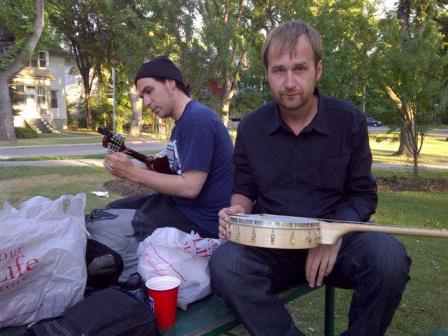 Uncle Sinner is a pretty loose concept. The musical cooperation between Uncle Sinner and Fuller Vengeance has been off and on. Fuller Vengeance keeps a low profile. He passed away in 2018. The limited media interest, even by gothic country standards, has been directed towards Uncle Sinner. As you might have read in my other articles the injustices in the "gothic country" genre are numerous, extensive and outrageous. It is also the case here. Uncle Sinner is a sadly over-looked artist and very undeservingly so. Uncle Sinner is, however, not someone you contact if you want to discuss issues like marketing plans, social media or channel management strategies. I don’t know much about what’s going on in Uncle Sinner's life, but I hope that he continues with his music and more albums will be released. The private economy of the artists/bands is generally the biggest obstacle for true artistic expression in this genre. Uncle Sinner released a collection with outtakes and rarities, "A Pocketful of Glass Eyes" digitally in March 2014 as a fundraiser. You can read my review of the “album” here. The second (proper) album "Let the Devil In” was released in January 2015. It was initially and tentatively scheduled to be released in late 2011, but has since then been postponed several times. Fuller Vengeance doesn’t appear on this album. The album follow the usual work method associated with Uncle Sinner, that is select songs, bring them to the smithy and forge them into a new shape and form, but still possible to discern. The selection of songs on the album is almost faultless. The album is similar to the debut album ”Ballads and Mental Breakdowns” in terms of content and themes. The arrangements and performance are wellproduced, but raw and needless to say never overproduced. The sound is - as promised - much better than the tracks on "A Pocketful of Glass Eyes" and for the most part a bit more complex (but not too complex). "Let the Devil In” is at least as good as ”Ballads and Mental Breakdowns". The album is actually released in cd format. You can read a review here, (opens in a new window). In January 2017 he started to work on a new album: “It's already almost 2 years since I released "Let the Devil In". Time to start planning album three, working title: "Trouble of this World". Gonna need a pot of coffee, an ashtray full of rusted nails and a broken compass that always points south.” You can read a review here, (opens in a new window).
Uncle Sinner is a pretty loose concept. The musical cooperation between Uncle Sinner and Fuller Vengeance has been off and on. Fuller Vengeance keeps a low profile. He passed away in 2018. The limited media interest, even by gothic country standards, has been directed towards Uncle Sinner. As you might have read in my other articles the injustices in the "gothic country" genre are numerous, extensive and outrageous. It is also the case here. Uncle Sinner is a sadly over-looked artist and very undeservingly so. Uncle Sinner is, however, not someone you contact if you want to discuss issues like marketing plans, social media or channel management strategies. I don’t know much about what’s going on in Uncle Sinner's life, but I hope that he continues with his music and more albums will be released. The private economy of the artists/bands is generally the biggest obstacle for true artistic expression in this genre. Uncle Sinner released a collection with outtakes and rarities, "A Pocketful of Glass Eyes" digitally in March 2014 as a fundraiser. You can read my review of the “album” here. The second (proper) album "Let the Devil In” was released in January 2015. It was initially and tentatively scheduled to be released in late 2011, but has since then been postponed several times. Fuller Vengeance doesn’t appear on this album. The album follow the usual work method associated with Uncle Sinner, that is select songs, bring them to the smithy and forge them into a new shape and form, but still possible to discern. The selection of songs on the album is almost faultless. The album is similar to the debut album ”Ballads and Mental Breakdowns” in terms of content and themes. The arrangements and performance are wellproduced, but raw and needless to say never overproduced. The sound is - as promised - much better than the tracks on "A Pocketful of Glass Eyes" and for the most part a bit more complex (but not too complex). "Let the Devil In” is at least as good as ”Ballads and Mental Breakdowns". The album is actually released in cd format. You can read a review here, (opens in a new window). In January 2017 he started to work on a new album: “It's already almost 2 years since I released "Let the Devil In". Time to start planning album three, working title: "Trouble of this World". Gonna need a pot of coffee, an ashtray full of rusted nails and a broken compass that always points south.” You can read a review here, (opens in a new window).
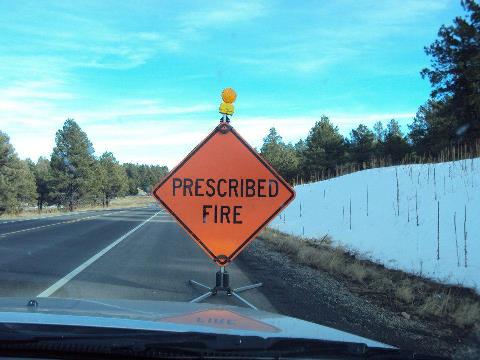 In addition to the band "Uncle Sinner", Uncle Sinner has a songwriter project which he calls “Prescribed Fire”. In the email, Uncle Sinner writes: “My intention is to work on that after "Let the Devil In" is done. I'm not prolific, but I have at least an album of songs I'm really happy with. They're too melodic to be Uncle Sinner songs--they sound more like Vic Chesnutt or early Iron & Wine songs I guess. I don't expect people to take much interest in it, but it would be nice to put out at least one cd of original stuff for friends and family and anyone else who likes it.” In the email, Uncle Sinner develops his view on the future for musicians/bands in the “gothic country” vein: “Well it's become a popular sub-genre. I've liked this kind of music for a long time, and it's really nice to see so many people taking an interest in that sound. What goes up tends to go down, so I don't know how popular it will be in ten years. Sometimes a sound will persist, once it picks up sufficient steam. People still make and listen to death metal 20 years later, so it's possible that gothic country can maintain itself as a sub-genre.” Another project is Star Thistle, a singer-songwriter project of Uncle Sinner. The album "The best of Star Thistle" was released in 2021 (available at Bandcamp).
In addition to the band "Uncle Sinner", Uncle Sinner has a songwriter project which he calls “Prescribed Fire”. In the email, Uncle Sinner writes: “My intention is to work on that after "Let the Devil In" is done. I'm not prolific, but I have at least an album of songs I'm really happy with. They're too melodic to be Uncle Sinner songs--they sound more like Vic Chesnutt or early Iron & Wine songs I guess. I don't expect people to take much interest in it, but it would be nice to put out at least one cd of original stuff for friends and family and anyone else who likes it.” In the email, Uncle Sinner develops his view on the future for musicians/bands in the “gothic country” vein: “Well it's become a popular sub-genre. I've liked this kind of music for a long time, and it's really nice to see so many people taking an interest in that sound. What goes up tends to go down, so I don't know how popular it will be in ten years. Sometimes a sound will persist, once it picks up sufficient steam. People still make and listen to death metal 20 years later, so it's possible that gothic country can maintain itself as a sub-genre.” Another project is Star Thistle, a singer-songwriter project of Uncle Sinner. The album "The best of Star Thistle" was released in 2021 (available at Bandcamp).
The debut “Ballads And Mental Breakdowns” was released in three editions with different album covers. The first two was in limited editions, while the third was the regular version. The first edition is the out-standing “Hand-version”, the second edition is the one in red and black and has the two sort of see-through figures, one kneeling, and the third edition is the yellow, white and black (skeleton portion with barn/church in background). All album covers are designed by talented artist Agnieszka Ledochowska. The artwork is extraordinary. It's not easy to keep track of the different editions. The record label Devil’s Ruin Records (DRR) has numbered them in a different order: 016, 018 and 017. To add to the confusion further, the limited #2 was the first one done, followed by the regular release #3, followed by the "hands" cover #1.
 |
 |
 |
In addition to the three editions shown above there was another album cover - the light bulb cover - but it was never used. Instead Devil's Ruin Records printed a few posters of it. In some small, but yet exclusive, circles probably worth a small fortune. This beautiful album cover is also made by Agnieszka Ledochowska.
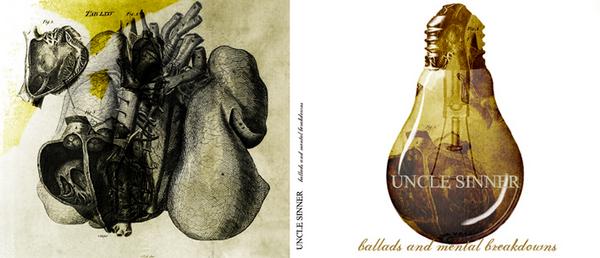
Here is the ordinary album cover set-up.
 |
 |
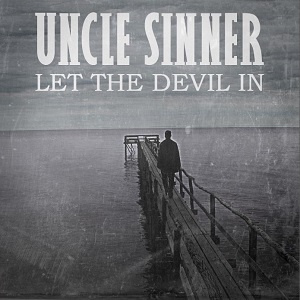 |
 |
 |
Below is a suggestion for a 2-CD compilation.
|
No |
Song |
Album |
|
1 |
Poor Pilgrim Of Sorrow |
Ballads And Mental Breakdowns |
|
2 |
Gospel Plow |
Ballads And Mental Breakdowns |
|
3 |
The Cuckoo |
Ballads And Mental Breakdowns |
|
4 |
When Jesus Comes |
Ballads And Mental Breakdowns |
|
5 |
Josh Thomas Roustabout |
Ballads And Mental Breakdowns |
|
6 |
Jack Of Diamonds |
Ballads And Mental Breakdowns |
|
7 |
Red Rocking Chair |
Ballads And Mental Breakdowns |
|
8 |
Pretty Polly |
Ballads And Mental Breakdowns |
|
9 |
Old Rub Alcohol Blues |
Ballads And Mental Breakdowns |
| 10 |
Shady Grove |
Ballads And Mental Breakdowns |
| 11 |
You Got To Die |
Ballads And Mental Breakdowns |
| 12 |
Little Margaret |
A Pocketful of Glass Eyes |
| 13 |
Want To Go To Cuba, Can't Go Now |
A Pocketful of Glass Eyes |
| 14 |
The Cuckoo (demo) |
A Pocketful of Glass Eyes |
| 15 |
Blow, Gabriel |
Let the Devil In |
| 16 |
Wolves A-Howling |
Let the Devil In |
| 17 |
Jesus Was A Dying Bed Maker |
Let the Devil In |
| 18 |
900 Miles |
Let the Devil In |
| 19 |
Black Betty |
Let the Devil In |
| 20 |
Oh Death |
Let the Devil In |
| 21 |
Wayfaring Stranger/Wabash Blues |
Let the Devil In |
| 22 |
Creation Myth |
Trouble of this World |
| 23 |
Gallows Pole |
Trouble of this World |
| 24 |
Motherless Child |
Trouble of the World |
Best album: Ballads And Mental Breakdowns and Let the Devil In (can't decide)
Best songs: When Jesus Comes, The Cuckoo, Jack Of Diamonds, Shady Grove, 900 Miles, Oh Death, Wayfaring Stranger/Wabash Blues, Gallows Pole
